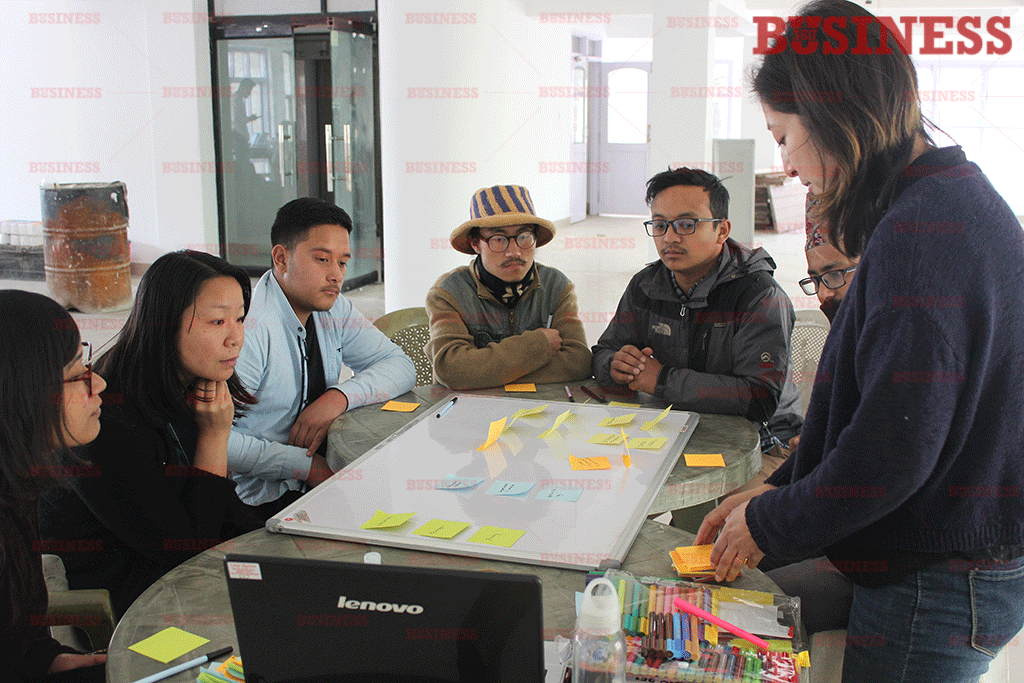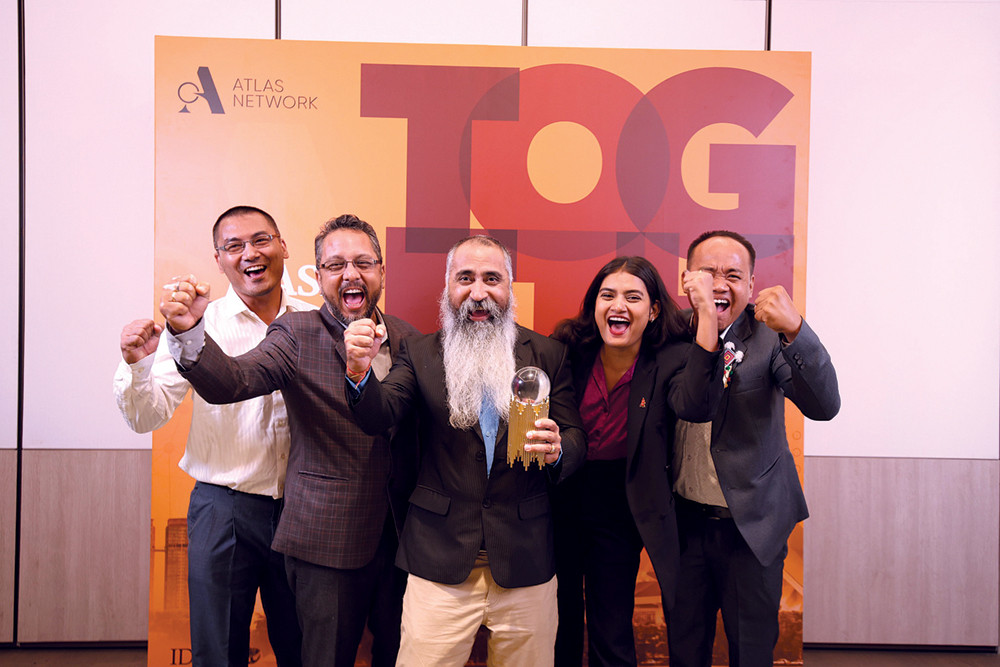
Text By: Sajeet M. Rajbhandari
Tracing its roots to the dense city slums in Asia, Utopia defines itself as an urban innovation group that was built with the primary focus of bringing innovation to modern day cities and their slums. Dori Nguyen, the Managing Partner for Utopia Kathmandu recounts that the founders of Utopia first started out by working in high population density regions in China, Bangladesh and Nepal, over a decade ago.
“While previously they were more focused on building community centers, especially for urban migrants in China, the company over time saw that there was a huge need for designing systems and processes that adapted to the needs of the informal settlements of the cities,” shares Nguyen. This initial led to the company discovering and diversifying their focus to dealing with the untapped potential that existed in the urban innovation space.
During its formative years, the Utopia team understood that there were many innovations from urban informal settlements that didn’t surface or were not paid attention to.
Utopia first arrived on Nepali soil in 2018 and has since been conducting research regarding informal settlements inside Kathmandu while working with a number of urban partners that share their vision for urban space and innovation. “Through this we have been identifying the most urgent pinpoints that we can find in the city and have been focusing on developing three in-house startups,” shares Nguyen. She elaborates that these startups are designed to solve acute issues that they have identified within the city; in Kathmandu these issues are urban migration, circular waste and early childhood education.
Further, Utopia has recently launched and is focusing on its new CITYLabs platform. The CITYLabs platform serves as an urban venture studio where Utopia can bring together actors from different fields to collaborate on innovative ideas and projects within the local level as well as connecting with the larger guild of CITYLabs that Utopia is expanding across the globe.
WhatUtopia holds dearly as a part of its ethos is the belief that the needs of the many should never be overlooked for the needs of the few. Towards this, Utopia actively works with other urban startups that share their ideals, supports young startups to develop their services and products, and provides these emerging businesses a physical platform for innovation. Doing so, Utopia believes can fill the void for a space where actors who care about the city can come together, collaborate and start creating interactions that address urban issues.
Through CITYLabs, Nguyen explains, “We’re really focusing on trying to work with governments, early stage startups, and also entrepreneurs who are interested in working in this space but don’t necessarily have an idea.” She goes on to say, “A lot of what we do with our in-house ventures is to identify issues and then we work with co-founders to co-build the ideas.” This also includes connecting with the private sector corporations and investors who are interested in the city as well. “We’re sector agnostic, but urban focused,” states Nguyen.
With the CITYLabs platform, the company believes it can provide collaborators not just a space that is open for events and networking but also help startups and individual innovators with their work or have them expand towards a better education model with like-minded partners. “We hope to see a lot of cross-pollination and partnerships being surfaced through the physical platform,” wishes Nguyen. She quickly adds that through the CITYLabs space, they also want to offer startups they work with other services such as accounting, marketing and essentials that a small startup may find difficult to manage.
In Kathmandu, much like their other bases in cities such Lagos and Rio, their focus is on urban ecosystems in the city. Utopia’s goals and targets in Kathmandu are set for the long run. Nguyen and the Utopia team want to help transition the city into functioning sustainably while uplifting the informal settlements, informal workforces, and the informal economy, in their journey. “Whatever form that it might take can vary,” shares Nguyen, “We might be working in early childhood education, or Fintech or Govtech; there will be ways in which the form changes, but we always focus on understanding how a business model is functioning right now, and also how it functions in the future.”
She gives an example, “If we have a Fintech startup, we always try to think about what happens in five years when this technology develops or goes away. We keep thinking about the future and we are always iterating towards that.”
On the innovations and ideas from a systems perspective, Nguyen says that the company not only thinks about how an idea affects an individual or a family, but also if the idea could be mobilised at a larger scale and retains relevance at a systems level. In its core form, all of Utopia’s innovations and business models revolve around the need to be urban residence centered, function at a macro level, and have an understanding of the role it will play in the future.
Utopia also has a CITYLabs Urban Innovation Fund through which they are seeking to collect seed funding for urban centric startups. Planned to be around a $100,000 investment fund, the CITYLabs Urban Innovation Fund is seen by Utopia as a way to fuel local ideas and early startups. The fund is also looking to catalyse domestic investments and strongly believes that there is a growing ecosystem of Nepali investors who are willing to take small risks, but ultimately boost the growing startup space in Nepal. While the CITYLabs Urban Innovation Fund is still in pilot stage, Utopia hopes that it can turn into a larger capital fund for urban innovation.
Globally, Utopia is still a fairly young startup, but the company believes that it can actually still create a strong platform for urban startups to connect across the globe through CITYLabs in a mechanism where a lot of smaller efforts come together and collaborate to form something bigger than all of them. While their mothership is located in San Fransico, USA, Utopia strives to maintain a somewhat unconventional organisational structure where the founding and managing partners are spread throughout their various chapters across the world.
“In each of the emerging cities that we work in, we have at least one managing partner who essentially starts up the operations, builds the team, builds the network and puts the strategy behind that studio,” says Nguyen. She also elaborates that in each city that Utopia has landed in, the company has really allowed the studios to grow organically and independently with the same philosophy of organic growth being applied at the company’s mothership level as well.
Nguyen shares, “All of the connections that we have are through organic professional and personal relationships; where we have often found that there is a high alignment in terms of approach and mindset.” Even the Kathmandu studio is divided into a managing partner, a creative director, associates, fellows, and interns. Nguyen claims that because it’s still such a small team, the company functions in less of a hierarchical level and more on a collaborative mechanism.
With the ultimate goalpost being the creation of a city that functions for the many and not the few, Utopia believes that any progress towards this direction is a win for them. When asked about what Utopia might be like in the long run, Creative Director of Utopia Kathmandu, Kayaa Rizal dreams, “We want to see Utopia and CITYLabs as a platfor, which is essentially a go to for anything in urban innovation, in terms of being an actor that connects different entities and individuals in the field.” Currently, Utopia Kathmandu is actively organising events that seek to create a discourse about the urban situations in Kathmandu and what can be done about them.



.jpg)


.jpg)